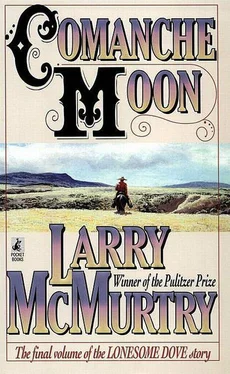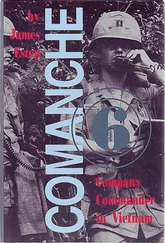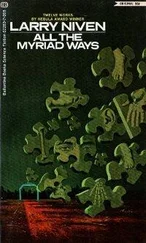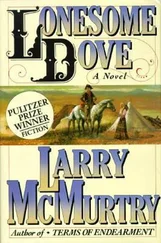"I'm told the Comanches bury their own," he said, uncertain as to what was right in such a case.
"I expect they would if they were here," Gus said. "But these men are dead--they can't bury themselves, and I expect they'll be bad torn up by the time a Comanche finds them." "I'm worried about that woman," Call said.
"I think she's about lost her mind." Deets boiled a little coffee over the Comanche campfire and fed the children a little bacon; the woman would take none. The men dug a grave and put the four dead warriors in it. While they were filling it in the woman began to shriek.
"He won't want me! I can't go home!" she shrieked. Then she ran away, out onto the prairie, shrieking, as she ran.
"I was afraid of this," Call said. The children were crying, though Deets tried to shush them. The men all stood, numb and confused, listening to the woman scream. Augustus mounted his horse.
"I'll get her," he said. He touched his horse with the spur and went loping after the woman.
"I was afraid of this," Call said again, looking at the stunned men.
Maudy Clark ran away several times a day, every day, of the two weeks it took the rangers to reach Austin. Another sleet storm delayed them, and then heavy rains, which made the rivers high and treacherous. Three horses bogged in the swollen Red River and drowned.
Still, whatever the weather, Maudy Clark ran away. Once caught, she was docile--she seemed to mind Deets less than the other men, so Deets was assigned the task of seeing that she didn't escape or hurt herself. It was Deets, too, who cared for her children; she seemed not to recognize them as her children now.
"Something's broke in her, Woodrow," Gus said. "She won't even help her own young 'uns, anymore." All the men were careful not to let Mrs. Clark snatch a knife or a gun; Call instructed them to be especially watchful. He did not want the woman to grab a weapon and kill herself.
"Bodies can heal--I expect minds can too," he said.
At night they had taken to tying Maudy's ankles with a soft cotton rope, hobbling her like a horse.
"If I were to break my whiskey jug I expect I could glue it so it would look like a fine jug," Augustus replied. "But it would still be leaky and let the whiskey run out. That's the way it is with her, Woodrow. They might get her back in church and sing hymns at her till she stops screaming them screams. But she'll always be leaky. She won't never be right." "I can't judge it," Call said. "It's our job to bring her home. Then the doctors can judge it." Finally they breasted all the rivers and came to the limestone country west of Austin.
"We're coming back with a passel of extra horses," Long Bill pointed out. "I expect we'll be heroes to the crowd." Just then, Maudy Clark started screaming. She ran right through the campfire. Neely Dickens made a grab for her, but missed. Deets, who had been cooking, got up without a ^w and followed her into the darkness.
"Hurry up, Deets, there's bluffso out here she might fall off of," Augustus said.
"I don't know how anybody could feel like a hero with that poor woman running around out of her mind," Call said.
"Well, but she might have been dead," Long Bill said. "That brave had a knife at her throat." "She might prefer to be dead," Call replied. "I expect she would prefer it." Just then Deets came back, leading Maudy, talking to her softly; all the men became silent.
The woman's despair dampened all their moods. They had not even had a lively card game on the trip south.
"I'm longing to see my Clara," Augustus said--they were in country that was familiar, where they had patrolled often; the familiar hills and streams made him think of his many picnics with Clara, the laughter and the kissing he had enjoyed throughout his long courtship. Surely, now that he had been promoted to captain, Clara wouldn't make him wait any longer. Surely she would marry him now.
"I hope we can find this woman's husband," Call said.
"You better hope he'll take her back, while you're hoping," Gus said.
"That's right, Woodrow," Long Bill said.
"Some men won't have their wives back, once they've been with the Comanches." "That's wrong," Call said. "It wasn't her fault she got taken. He oughtn't to have gone off and left her unguarded." "Sing to us, Deets," Augustus said. "It's too boresome at night, without no singing." Deets had been singing to the two little children at night, to quiet them and put them to sleep. Without his singing they grew restless and fearful; their mother rarely came near them now. Deets had a low soothing voice, and knew many melodies, hymns mostly, and a few songs of the field; it was not only the children that were soothed by his singing. Long Bill was able to accompany Deets on his harmonica, most of the time.
Though the men were calmed by the singing, Call wasn't. Usually, after listening a few minutes, he took his rifle and went off to stand guard.
What rested him, after a day of contending with the circumstances of travel--the girth on the pack mule might break, or they might strike a creek that looked dangerous to cross--was to be by himself, a hundred yards or so from camp. Whereas guard duty seemed to make most of the rangers sleepy--there being nothing to do but sit and stare--it made Call feel at his most alert. He had a keen ear for night sounds--the rustling of varmints, the cries of owls and bullbats, deer nibbling leaves, the death squeak of a rabbit when a coyote or bobcat caught it. He listened for variations in the regular sounds, variations that could mean Indians were near; or, if not Indians, then some rarely encountered animal, like a bear.
Often he would sit all night at his guard post, refusing to change guards even when it was time.
From time to time in the night, Maudy Clark shrieked--j two or three shrieks, sounds that seemed to be jerked out of her. Call wondered if it might be dreams that called up the shrieks.
He doubted the poor woman would live long enough for the violent memories to fade.
When he came back to camp, a little before dawn, only Deets and Maudy were awake. The woman was fiddling with the buttons of an old shirt Long Bill had given her. She looked wild in her eyes, as if she might be getting ready to make one of her dashes out of camp. There was gray mist rising, making it hard to see more than a few feet. If the woman got away, with it so foggy, there might be a long delay while they located her.
Deets anticipated the very thing that Call feared.
"Don't you be running now, ma'am," he said.
"You'll get thorns in your feet if you do.
Prickly pear all over the ground. You'll be picking them little fine stickers out all day, if you go running off now." She had untied the cotton rope that he bound her ankles with. Gently, Deets retied it, and Maudy Clark made no protest.
"Just till breakfast," Deets assured her.
"Then I'll let you go."
They brought the horses and the rescued captives into Austin on a fine sunny morning. Nothing prompted a crowd like the rangers' return, whether they had been patrolling north or south.
Folks that had been dawdling in stores came into the street to ask questions. The blacksmith neglected his tasks until he heard the report. The barber left customers half shaven. The dentist ceased pulling teeth.
Somebody ran to alert the Governor and the legislators, though most of the latter were drunk or in bordellos and thus not easily rounded up.
The first thing everybody noticed was that no short man on a big horse was leading the troop back home: where was the great Captain Scull?
"Tracking a horse thief, that's where," Augustus said, a little annoyed that most of the questions were about the captain who had cavalierly deserted them while they were doing brave work. Gus saw Jake Spoon lurking over by the blacksmith's and waved at him to come help with the horses. He was anxious to get on to a barroom and sample some whiskey, quick.
Читать дальше












